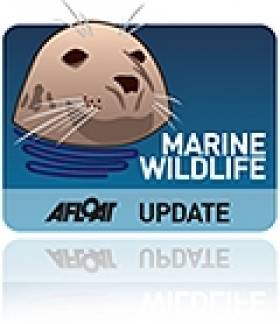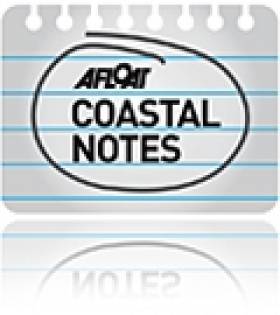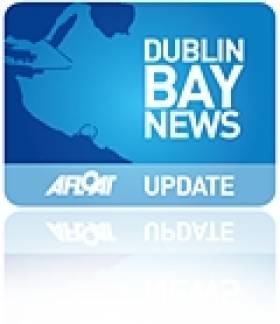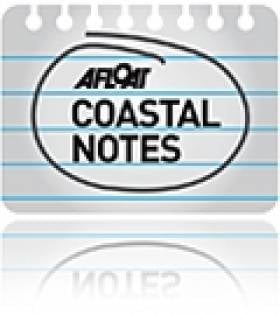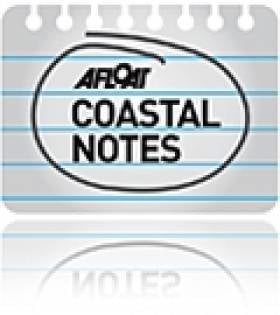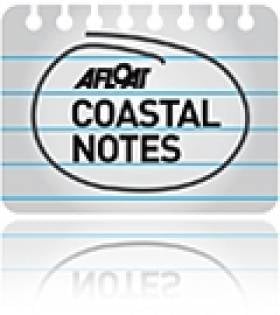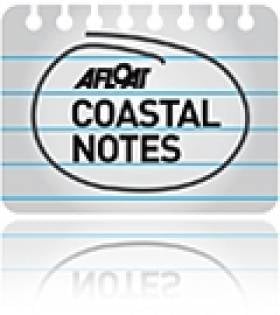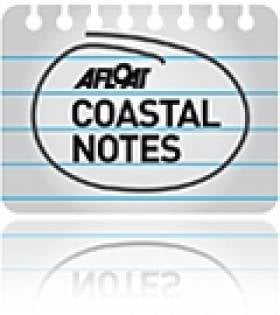Displaying items by tag: Providence Resources
Concern Over Impact of Seismic Survey on Dublin Bay Porpoises
#PORPOISES - The Irish Whale and Dolphin Group (IWDG) has expressed concern over the potential impact of a 2D seismic survey on harbour porpoises in Dublin Bay.
As recently reported on Afloat.ie, Providence Resources has been granted a foreshore license for the Dalkey Island Prospect in the Kish Bank Basin to allow for a well site survey, and exploration well and a seismic survey.
But the IWDG has written to Minister of State Jan O'Sullivan suggesting that he Environmental Risk Assessment (ERA) conducted on the area is deficient.
The group argues that the ERA has not assessed the footprint of the seismic survey, saying the mitigation proposed is inadequate and that the disturbance and impact to cetaceans – especially harbour porpoise – is "potentially significant and in contravention of national legislation and EU Directives".
Moreover, the IWDG claims that an Environmental Impact Assessment (EIA) of the effect of a seismic survey on harbour porpoise "doesn’t seem to have been carried out".
The harbour porpoise, which is an Annex II species, is entitled to strict protection. The species has been recorded at very high densities in Dublin Bay during surveys carried out by the IWDG in 2008 on behalf of the National Parks and Wildlife Service (NPWS).
The group says that impact monitoring is needed to gather data on the effects of seismic surveys on harbour porpoises, and recommends it as an additional condition on the license.
"Compliance with the NPWS guidelines does not constitute monitoring and as porpoises are elusive and spend 95% of their time underwater and are difficult to see in a sea state greater than Force 1, the guidelines do not serve to protect them once the works are on-going.
"In addition there are specific data required on their site usage prior to the works and a monitoring plan to assess how they recover after the works."
Moreover, the IWDG claims that in this instance the NPWS "are negligent, as they are not providing strict protection to an Annex II species."
Earlier this year Environment Minister Phil Hogan rejected a call from Tánaiste Eamon Gilmore and others for a public enquiry into the Dalkey Island foreshore licence.
Fastnet Oil Plans Celtic Sea's Biggest Seismic Survey
#OIL - Fastnet Oil & Gas will spend more than €20 million on the Celtic Sea's biggest ever seismic study, the Irish Independent reports.
The company was recently awarded two blocks in the waters south of Ireland which were drilled in the 1980s and subsequently abandoned.
But new techniques in the oil industry are allowing previously unviable resources to be extracted - as Petrel Resources are planning to do off the Kerry coast, following the discovery of enormous oil reserves in the Porcupine Basin.
And the Celtic Sea in particular has already attracted attention after Providence Resources announced its discovery of oil reserves at its Barryroe prospect potentially worth billions of euros.
Fastnet Oil, chaired by Cathal Friel, is currently in discussions with major oil groups with a view to sharing the costs of the seismic survey.
Providence Awarded Foreshore Licence for Dublin Bay Study
#dalkey island – Providence are to procure a site survey vessel and drilling unit to drill at the Dalkey Island prospect following an announcement this morning that the Irish listed exploration company has been been awarded a foreshore licence.
As previously reported on afloat.ie in February Environment Minister Phil Hogan rejected a call by Tánaiste Eamon Gilmore and others for a public inquiry into Providence Resources foreshore licence application to survey the site 6 kilometres off the bay shoreline.
The licence for an area in the Kish bank basin allows the company to carry out a 2D seismic study, a well site survey and drill an exploration well on the prospect.
New Targets for Oil Exploration Off Southwest Coast
#COASTAL NOTES - Oil exploration company Petrel Resources has identified a number of new targets off the southwest coast of Ireland as it seeks bigger partners for its venture.
The Irish Times reports that the Dublin-based firm was awarded licensing options over 1,400 sq km of the Porcupine Basin or Porcupine Blight in the Atlantic Ocean, west of Dursey Island in Co Kerry.
It has since completed two phases of work in the area, and says technical studies of its blocks in the northern and eastern parts of the basin, where is is testing for the presence of reservoir sands, were "encouraging".
The announcement comes following the success of Providence Resources' prospect in the Celtic Sea off the south coast.
As previously reported on Afloat.ie, the Barryroe field may deliver in excess of 2 billion barrels of oil, a flow expected to be worth billions of euro to the Irish economy in future years.
The Irish Times has more on the story HERE.
Sailing Medals Could Bring In Big Sponsorship
#OLYMPICS - Ireland's impressive showings in aquatic sports at the London Olympics may be the key to bringing in much needed corporate sponsorship, as the Evening Herald reports.
Sailing in particular has yet to capture the public's imagination in the same way as track and field athletics or boxing.
But with 22-year-old Annalise Murphy riding high in first place in the Laser Radial standings and on course to take the gold medal, the sport's profile is rising - and headline sponsors will surely come following the lead of her personal sponsor Tayto, and new sailing supporter Providence Resources.
The oil exploration firm - which recently struck a black gold bonanza off the south coast - signed on as a "generous" sponsort of the Irish Sailing Association (ISA) earlier this year, which is just the ticket for what can be an expensive sport.
ISA performance director James O'Callaghan said that big-ticket sponsorship would be a welcome addition to the "vital" grants received from the Irish Sports Council.
"The results that Annalise has had so far show how our teams are able to compete on an international level," he added.
"I think it's a good package for any sponsor. They are a really young team with Annalise, the 49ers and then we got a medal in the Youth Worlds in July for the first time in 16 years."
The Evening Herald has more on the story HERE.
#COASTAL NOTES - Providence Resourses has announced that its Barryroe oil field off the south coast may be as much as four times larger than anticipated, according to The Irish Times.
Afloat.ie previously reported on the Irish mineral exploration group's discovery in April this year, when the company confirmed the presence of light oil with an appraisal well at the site in the north Celic Sea.
Then on 15 March the firm announced that oil had begun to flow successfully from the Barryroe structure at a rate that could be worth billions of euro to the Irish economy.
The latest news suggests it could be worth even more over a longer period of time, as data compiled from six test wells on the site along with seismic data have led experts to estimate the field contains between 1 and 1.6 billion barrels of oil.
“It is clear that Barryroe is a substantial oil accumulation across multiple stacked horizons with much running room for further resource growth," said Providence chief executive Tony O'Reilly Jr.
The company also expects to begin explorations off Dalkey Island in Co Dublin by the end of the year, pending approval of its foreshore permit.
The so-called 'Dalkey Island prospect' has sparked much debate about its potential risks and benefits among the local community.
Oil Strike Success Off Cork Coast Could Be Worth Billions
#COASTAL NOTES - Providence Resources has struck big off the south coast of Cork with an oil flow that could be worth billions of euro to the beleaguered Irish economy.
According to the Guardian, the Dublin-based company announced yesterday that oil had started to flow successfully from its Barryroe structure in the north Celtic Sea at nearly twice the rate previously projected.
Providence Resources CEO Tony O'Reilly Jr said the discovery was a "seminal day for Ireland, especially in the runup to St Patrick's Day."
Last month the firm had confirmed the presence of light oil with its first appraisal well at the site, a situation described by its technical director as "extremely encouraging".
Now that a steady flow has been achieved, future extraction from the oil field - comparable to a medium-to-large North Sea field - can surely proceed, which now puts pressure on the Government to grand permission for further exploration around the Irish coast.
As previously reported on Afloat.ie, plans by Providence Rescources to prospect for oil on the east coast off Dalkey Island have been met with fierce opposition by mainland residents and environmental groups.
The Guardian has much more on the story HERE.
South Coast Oil Appraisal 'Extremely Encouraging'
#COASTAL NOTES - Providence Resources has found light out with its first appraisal well off the south coast of Ireland, Offshore reports.
The company's semi-submersible GSF Arctic III drilled a well in 100m water to a depth of more than 2km on its Barryroe structure in the north Celtic Sea.
Indications of hydrocarbons were noted during the drilling, and further tests have confirmed the presence of 12.5m of 'net pay' (the thickness of rock that can deliver oil at a profitable rate) with as much as 87% hydrocarbon saturation.
The next stage will be a well flow test programme to determine whether future oil extraction can proceed.
“The confirmation of high quality light oil within a porous and potentially laterally extensive sandstone system is extremely encouraging," said technical director John O'Sullivan.
As previously reported on Afloat.ie, plans by Providence Rescources to prospect for oil pn the east coast off Dalkey Island have been met with fierce opposition by mainland residents and environmental groups.
Offshore has more on the story HERE.
Minister Rejects Public Inquiry into Dublin Bay Oil Drilling
#DALKEY ISLAND PROSPECT – Environment Minister Phil Hogan has rejected a call by Tánaiste Eamon Gilmore and others for a public inquiry into Providence Resources foreshore licence application to survey and drill for oil and gas in Dublin Bay, the Irish Times reports.
Mr Hogan has said that as the application by Providence Resources for survey and drilling work 6kms off Dalkey Island was the subject of public consultation, he did not consider a public inquiry "necessary".
Tánaiste and Labour Dún Laoghaire TD Eamon Gilmore said earlier yesterday that Mr Hogan should exercise his right to hold an oral hearing under the foreshore legislation. Last month, the Green Party and a number of residents in the Dalkey area also called for an inquiry.
Speaking in Galway yesterday, Mr Gilmore acknowledged that a "couple of wells" had been drilled in Dublin Bay previously, but there were a "lot of issues" relating to the current application.
To read more about this story click HERE
Dolphin Group Comments on Dalkey Island Prospect
#DALKEY ISLAND PROSPECT - The Irish Whale and Dolphin Group (IWDG) has joined the chorus of opposition to the proposed oil and gas exploration off Dalkey Island in Co Dublin.
As previously reported on Afloat.ie, Providence Resources has applied for a foreshore licence to search for oil or gas about 6km out to sea on the Kish Bank Basin.
But the prospect has provoked a split in the local community over the potential risks and benefits, with many calling for a public enquiry into the licence before it is granted.
This evening an urgent meeting in Dun Laoghaire will address the public's concerns, which have been echoed by the IWDG.
"The Kish Bank and adjacent waters are important for cetaceans," said the group in a statement. "In addition, sightings of bottlenose dolphins have increased dramatically in the area following the presence of a group of three individuals since August 2010."
The IWDG is concerned about the potential effects on dolphins and porpoises that "could due to noise generated from the drilling process", noting that "there is little published data on the intensity and effects of sound generated by drilling".
Protest group Protect Our Coast has launched a online petition against the Dalkey Island Prospect citing concerns over the proximity of the drilling area to the mainland as well as the Special Protection Area of Dalkey Island, which is a haven for marine wildlife.
- Irish Whale and Dolphin Group
- IWDG
- Dalkey Island Prospect
- Coastal Notes
- Dalkey Island
- Dublin
- oil and gas
- exploration
- drilling
- Providence Resources
- foreshore licence
- Kish Bank Basin
- community
- Dun Laoghaire
- bottlenose dolphins
- Porpoises
- Cetaceans
- noise
- sound
- Protect Our Coast
- protest
- petition
- Special Protection Area
- marine wildlife



























